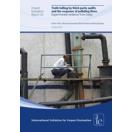
Truth telling by third-party audits and the response of polluting firms: Experimental evidence from India
3ie Impact Evaluation Report 10
How accurate and credible is an environmental audit if the auditor is chosen and paid for by the firm being audited? In this 3ie-supported impact evaluation report, Esther Duflo, Michael Greenstone, Rohini Pande and Nicholas Ryan provide a clear answer. Their impact evaluation of an environmental audit scheme in Gujarat shows such an arrangement encourages corruption and misreporting of industrial plant emissions. Independent audits on the other hand produce more accurate reports and prompt firms to curtail pollution.
In response to these findings, the Gujarat Pollution Control Board (GPCB) is changing its regulations to ensure that audits are independent.
The impact evaluation
This impact evaluation in Gujarat is the first randomised controlled trial conducted on an environmental regulation. It examines the impact of reforming the system of environmental audits for industrial plants.
The trial involved a sample 473 audit-eligible plants in Ahmedabad and Surat in which 233 were exposed to the new system and the remaining acted as the control group. In the control group, plants remained in the status quo system, directly choosing and paying their third party auditors. In the treatment group, auditors were randomly assigned to the plant and paid a fixed fee from a central pool of funds. In addition, their audit reports were subjected to random back-checks by independent agencies. In the second year, auditors working in the treatment group were paid a bonus for accurate reporting.
Results
The findings of this study are:
- Auditors working under the standard scheme were systematically under-reporting pollution readings.
- Auditors in the modified scheme reported much more accurately, as measured by comparisons of auditor reports and independent back-checks, showing many more firms to be above the threshold.
- Plants that were part of the improved audit scheme reduced their pollution emissions.
Policy influence
On 23 January 2015, the GPCB reformed its environmental auditing system based on the findings from this study. As per the new guidelines, environmental auditors in Gujarat will now be randomly assigned to industrial plants and have their work double-checked for accuracy.




